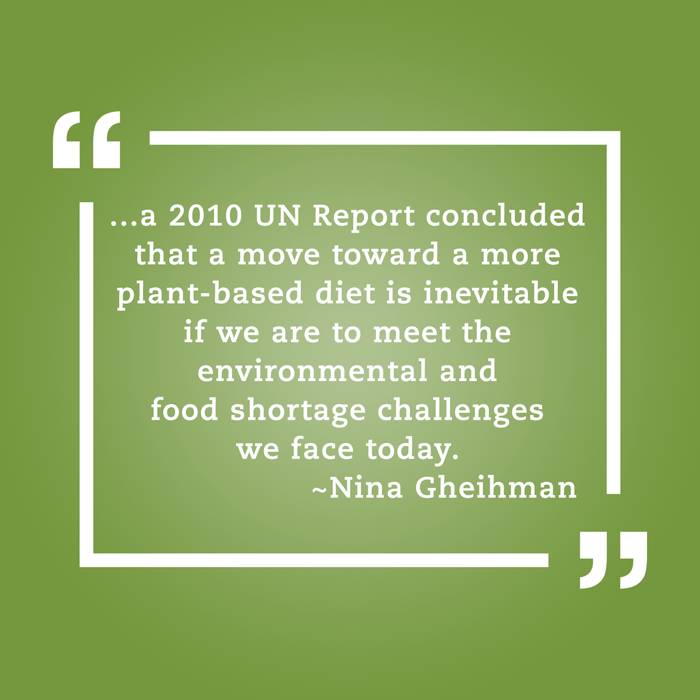Based on the “speed talk” Nina Gheihman presented at Global Food Plus 2017, February 24, 2017, which was recorded live on Facebook.

The year 2016 was hailed the “Year of Veganism.”[1] In the last year alone, Google searches for the term “vegan” increased by 32 percent; the World Health Organization classified processed meat as a carcinogen in the same class as cigarettes[2]; and a survey by Nutrition Business Journal found that more than a third of people consume dairy and meat alternatives regularly.[3] While many people still see veganism—the non-consumption of products derived from animals—as an extreme cultural practice, it is clear that veganism is no longer a marginalized social movement. This brings up the intriguing sociological question: How does a fringe cultural practice become mainstream?
Cultural and organizational sociologists have long studied why people join social movements, how social movements grow, and their consequences. However, less well understood are the microdynamics by which social movements become culturally meaningful. In my preliminary research I argue that the primary driver of the increased interest in veganism over the last five years can be attributed to the emergence of a new class of promoters I call “cultural brokers” who have transformed what it means to be an activist today. These brokers have a foot in several worlds—some in the corporate realm, others in the media, and still others in academia. Given their position in these intersecting fields, they are able to draw on ideas and resources from various spheres, and therefore change the collective societal image we have of veganism. At the same time, given that veganism is an increasingly global movement, these brokers must be strategic to target their work in particular ways across social contexts, since what is effective in one society may not resonate in the same way in another setting.
Why practice veganism? There are the proven health benefits of cutting out animal products, the huge environmental costs of meat, and the ethical issues of modern-day factory farming and food security. From a health perspective, plant foods have the potential to improve human health and reduce healthcare costs globally by preventing lifestyle diseases such as heart disease, type-2 diabetes, and certain site-specific cancers.[4] From an environmental perspective, according to a 2006 UN Report, livestock are responsible for approximately 18 percent of greenhouse gas emissions[5], more than the entire global transportation sector.[6] Animal agriculture is also a dominant contributor to concurrent environmental problems such as land use, freshwater pollution, food waste, species extinction, deforestation and native habitat destruction, erosion, and pesticide usage for monoculture feed stocks.[7]
From the perspective of food security, livestock consume more than half of the world’s crops, but in return produce only 14 percent of the global food supply[8] and waste nine to thirty-five times the amount of calories they consume.[9] A recent study[10] showed that “given the current mix of crop uses, growing food exclusively for direct human consumption could, in principle, increase available food calories by as much as 70 percent, which could feed an additional four billion people (more than the projected 2–3 billion people arriving through population growth).” As a whole, animal-based foods are implicitly less healthy, more environmentally harmful, and more wasteful per unit of calorie or protein than plant foods. Summarizing these issues, a 2010 UN Report[11] concluded that a move toward a more plant-based diet is inevitable if we are to meet the environmental and food shortage challenges we face today. As such, at least partial veganism may no longer be a choice in the future, but a reality enforced by the limits of our planetary resources.
But how have cultural brokers translated these facts into culturally meaningful narratives? One thing cultural brokers have done is expand the core ideological tenets of veganism. The vegan movement was undoubtedly borne out of the animal rights movement. In the 1980s and 1990s, animal rights activists focused on issues such as fur, vivisection, and other issues that, although important, focused on a tiny minority of animals used by humans.[12] It was only when animal rights activists shifted their attention to farmed animals—the vast majority of animals used by humans—that the focus on food took place. Yet today, especially in the United States, the primary focus is much more about health and environment than it is about animal suffering. There are activists who still do the hard work of protesting, handing out leaflets, and campaigning traditionally associated with activism, but these tactics are likely only to work with a minority of people. Cultural brokers, on the other hand, emphasize that is it possible to be part of the vegan movement without necessarily being vegan, which means in fact that a wider variety of people might be drawn to this cultural practice.

In my dissertation, I compare veganism in three countries: the United States, France, and Israel, which I chose because they represent unique cases of how veganism is culturally defined. In the United States, cultural brokers have turned veganism into something desirable and therefore consumable. The American focus on health and environmentalism has actually helped the vegan movement grow, since the focus on food and sustainability resonates with other lifestyle trends surrounding health and fitness, as well as with the entrepreneurial landscape. Here we see companies emerging such as Hampton Creek, which put a dent in the egg industry with its vegan mayonnaise, and Beyond Meat, which created a plant-based chicken meat so realistic that it convinced Bill Gates to back the company.[13] Or consider John Mackey, the CEO of Whole Foods. While himself a staunch vegan, he sells animal products in his stores because his clients demand it. Mackey’s cultural influence depends on running a successful corporation, despite what vegan critics might say. In the process, cultural brokers have made a trade-off between ideological purity and movement boundary expansion, which in turn has allowed a wider variety of people to participate in the movement.
On the other hand, I found that that in both France and Israel, animal rights are still more central than in the United States. Is this just cultural delay, and eventually both countries will follow the American path? Or does the animal rights component of veganism resonate better in those contexts? In France, veganism has become tied to national identity and the opposition against factory farms that are seen as a US import. The French do not immediately embrace veganism per se, but they do take well to the idea that today’s farming practices are a far cry from traditional approaches, which aligns with their ideas of protecting cultural customs. Even so, in the land of gastronomy synonymous with foie gras, cheese, and butter, I witnessed the nascent innovation of chefs who are attempting to veganize classical French dishes. They are following in the footsteps of those like Michelin-starred Alain Passard[14], who cleared most of the meat out of his kitchen in favor of the versatility of vegetables in 2001. In turn, he inspired a generation of chefs who are less hesitant to experiment, especially given the pressures of high-end clients.
In Israel, meanwhile, it is already easier to be vegan given the local diet, but people only began to respond to this lifestyle idea when brokers managed to find a way to package animal rights with human rights. But this is a messy cultural process, since for example, now the Israeli military has also embraced veganism, and offers vegan helmets, boots, and food to its soldiers, raising questions about what that means for the relationship between civil duty and morality.[15] Additionally, the entrepreneurial trend is also nascent in Israel, where there is significant start-up culture with ties to the United States. Among the most significant companies is SuperMeat[16] which is growing chicken meat in the laboratory without growth hormones or other additives. Ultimately the company is still motivated by ethical issues, since they argue that with lab-grown meat there does not need to be a trade-off between taste and moral principles. As such, while veganism is a global movement, in each country the various meanings of this cultural practice resonate differently across local contexts, and cultural brokers must be strategic about how they use these meanings to their advantage.
The global growth of the vegan movement can teach us a few lessons, regardless of our personal preferences. For those trying to promote veganism, it teaches us that there might be a tradeoff between ideological purity and boundary expansion—that is, by definition in order to expand the movement it must incorporate brokers from different worlds who can use their positions to push the movement in new directions. But it also teaches us that we cannot just focus on the United States alone, since what works to promote the movement here may not work in the same way in other societies. Still, one of the most exciting developments in the vegan movement is its entry into the sphere of entrepreneurship, and thus activism has been transformed into innovation rather than protest per se. Coincidentally, in this case, what works in the market may also help mitigate some of our most pressing global food issues.
— Nina Gheihman, WCFIA Graduate Student Associate and PhD Candidate, Department of Sociology, Harvard University.
Nina Gheihman is a Graduate Student Associate at the Weatherhead Center for International Affairs, and is a PhD candidate in the Department of Sociology at Harvard University. She is one of the presenters participating in Global Food+ 2017: 24 Speed Talks at the Nexus of Food, Agriculture, Environment, Health, and Society on February 24, 2017. Her talk is based on her forthcoming dissertation.
References
- PETA, 2016. “Why 2016 is the #TheYearofVegan”. Link: http://www.peta.org/features/year-of-vegan/.
- World Health Organization, 2015. “Q&A on the Carcinogenicity of the Consumption of Red Meat and Processed Meat” Link: http://www.who.int/features/qa/cancer-red-meat/en/.
- Latest Vegan News. 2016. “Research Suggests 26% of Americans Open to Plant-Based Eating.” Link: http://latestvegannews.com/research-suggests-36-of-americans-open-to-pla....
- Springmann, M., Godfray, H.C.J., Rayner, M. and Scarborough, P., 2016. Analysis and valuation of the health and climate change cobenefits of dietary change. Proceedings of the National Academy of Sciences, 113(15), pp.4146–4151.
- Gerber, P.J., Steinfeld, H., Henderson, B., Mottet, A., Opio, C., Dijkman, J., Falcucci, A. and Tempio, G., 2013. Tackling climate change through livestock: a global assessment of emissions and mitigation opportunities. Food and Agriculture Organization of the United Nations (FAO).
- United Nations. 2006. “Livestock’s Long Shadow: Environmental Issues and Options.” Food & Agriculture Organization UN. Link: ftp://ftp.fao.org/docrep/fao/010/a0701e/a0701e00.pdf.
- Steinfeld, H., Gerber, P., Wassenaar, T., Castel, V., Rosales, M. and De Haan, C., 2006. Livestock's long shadow (p. 229). Rome: FAO.
- Wirsenius, S., 2003. The Biomass Metabolism of the Food System: A Model-Based Survey of the Global and Regional Turnover of Food Biomass. Journal of Industrial Ecology, 7(1), pp.47-80.
- Eshel, G., Shepon, A., Makov, T. and Milo, R., 2014. Land, irrigation water, greenhouse gas, and reactive nitrogen burdens of meat, eggs, and dairy production in the United States. Proceedings of the National Academy of Sciences, 111(33), pp.11996-12001.
- Cassidy, Emily S, Paul C. West, James S. Gerber, and Jonathan A. Foley. 2013. “Redefining Agricultural Yields: From Tonnes to People Nourished per Hectare.” Environmental Research Letters 8(3).
- United Nations. 2010. “Assessing the Environmental Impacts of Consumption and Production: Priority Products and Materials.” UNEF. Link: http://www.unep.fr/shared/publications/pdf/DTIx1262xPA-PriorityProductsA...
- Elizabeth Cherry. 2016. Culture and Activism: Animal Rights in France and the United States. Taylor and Francis.
- Bill Gates, “The Future of Food.” Link: https://www.gatesnotes.com/About-Bill-Gates/Future-of-Food.
- Muhlke, Christine. 2015. “Inside the World of L’Arpège’s Alain Passard, the Man Who Made Vegetarian Cooking Cool.” Bon Appétit. Link: http://www.bonappetit.com/people/chefs/article/larpege.
- “Big in Israel: Vegan Soldiers”. December 2014. The Atlantic. Link: https://www.theatlantic.com/magazine/archive/2015/12/big-in-israel-vegan....
- SuperMeat. Link: http://www.supermeat.com.
Photo Credit: Michelle Nicholasen, Communications Specialist, Weatherhead Center for International Affairs.
